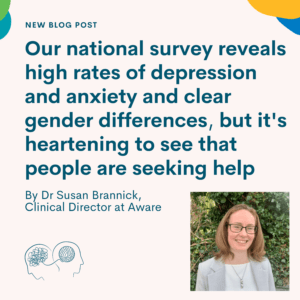
This week we launched our national mental health survey. The results highlight the experience of depression and anxiety many people in Ireland are living with. Whilst rates of distress are high, it was also heartening to read that most people surveyed had sought help when they felt they needed it, and had taken action to improve their mental health, whether that be through going to their GP, talking to a trusted friend, making changes to diet, exercise, or connecting with others and enjoyable activities.
It was good to read that the majority of people who had sought help felt this to be a positive experience that had met their needs. This is an important finding as anxiety and depression can often fill us with negative thoughts and fears about whether anything can help. What most people find however is that when we do something we have been avoiding or worried about, is that it goes much better than anxiety or depression tells us it will.
There are so many interesting findings in the survey, and one of the many that stood out for me was some of the gender differences in the results. For instance, women were more likely to have a diagnosis of depression with a quarter reporting that their mood can be so low it gets in the way of their day to day functioning. This finding of high rates of depression as well as anxiety in women is in line with what is known already in mental health research.
Also of note, is that one third of men reported not seeking help with their mental health. These results show the complex nature of differences in mental health differences across genders. For instance, is increased diagnosis in women because more women are experiencing depression/anxiety or are men not getting diagnosed as often because they are less likely to come for help. Why might some men not seek out help? Again the reasons for this are varied and complex, and some research says that men may be less likely to acknowledge signs of depression or if they do recognise them, they may judge them as not severe enough to need help. And why might these judgments happen? Some studies report that social and cultural ideas around gender and gender stereotypes may influence how people perceive their own personal experiences. Equally according to some research, men are less often asked about potential psychological suffering in part because of gender norms.
Different genders are also likely to experience different life experiences related to their gender and may face then different challenges in accessing mental healthcare. For instance studies show that transgender people can be at higher risk of developing mental health difficulties.
A recent report form the National Women’s Council of Ireland highlighted that women are disproportionally impacted by several risk factors for developing mental health difficulties, and within this marginalised woman are disproportionately impacted again. These include violence, poverty, low socio-economic status and caring responsibilities. It has been found that these groups of women, including those living in Direct Provision, those living in abusive relationships and women in low incomes, face barriers to accessing mental health supports.
So the more we dig into this, the more the picture broadens out from the personal into the wider social and cultural environment and the many factors that can influence how people experience psychological distress, what drives distress, how people may relate or respond to distress and what actions they take in it. As well as the role of society and health structures in how mental health is understood and responded to.
Our survey results highlight the importance of acknowledge signs of suffering across genders and to reach out for help. For more information on specific issues relating to gender and mental health have a look at our webinar and support pages.
This blog is by Dr Susan Brannick, Clinical Director at Aware as part of a monthly blog series.


